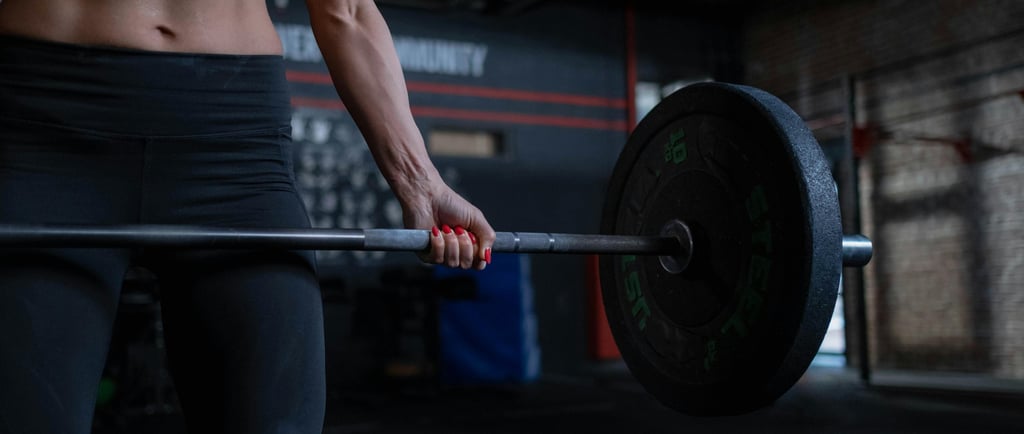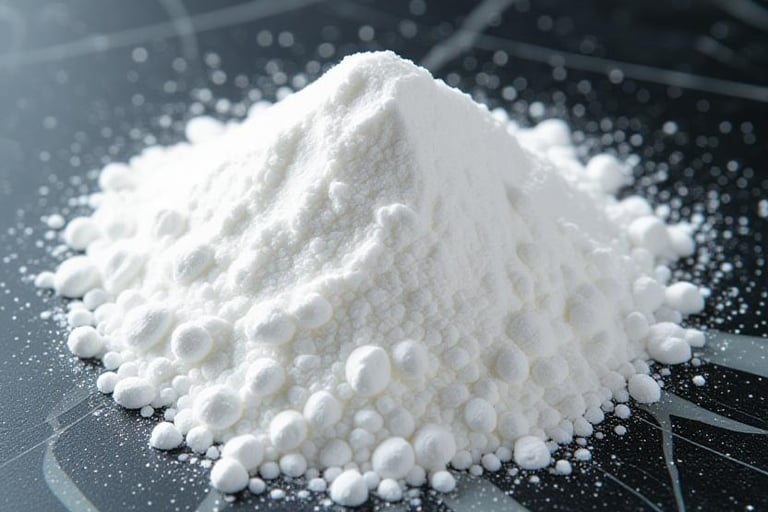What Is Creatine, and Why Should Women Care?
Creatine is often associated with bodybuilders and gym bros chasing muscle gains, but this powerful supplement deserves a spot in every woman’s wellness routine. Read more >
NUTRITION
Hērnú wellness
9 min read


What Is Creatine, and Why Should Women Care?
Creatine is a naturally occurring compound found in small amounts in foods like meat and fish and produced by the body in the liver, kidneys, and pancreas. It’s stored primarily in muscles, where it helps produce adenosine triphosphate (ATP), the molecule that fuels energy-intensive activities like lifting weights, sprinting, or even thinking hard. While the body makes about 1-2 grams of creatine daily, supplementing with creatine monohydrate—the most studied and effective form—can significantly enhance its benefits.
For women, creatine offers a wide range of advantages that go beyond muscle growth. Whether you’re a busy mom, a career-driven professional, a fitness enthusiast, or someone navigating the hormonal changes of menopause, creatine can support your goals. Let’s break down the key benefits and why this supplement is a must-have.
The Physical Benefits of Creatine for Women
1. Enhanced Strength and Muscle Performance
One of creatine’s most well-known benefits is its ability to improve strength and exercise performance. By increasing the availability of ATP, creatine allows muscles to work harder and recover faster during high-intensity activities like weightlifting, HIIT workouts, or sprinting. Studies show that women who supplement with creatine experience significant improvements in strength, power output, and muscle endurance, even without bulking up.
For women, this translates to practical benefits: lifting heavier weights, crushing spin classes, or keeping up with kids or grandkids without feeling drained. Importantly, creatine doesn’t automatically lead to a “bulky” physique—a common concern. Instead, it supports lean muscle growth, giving you a toned, strong look without excessive size.
2. Faster Recovery and Reduced Fatigue
Creatine helps reduce muscle damage and inflammation after exercise, which means less soreness and quicker recovery. For women juggling workouts with busy schedules, this is a game-changer. A 2016 study in the Journal of Strength and Conditioning Research found that women taking creatine recovered faster from high-intensity exercise compared to those on a placebo, allowing them to train more consistently.
This benefit extends beyond the gym. Whether you’re chasing a toddler or powering through a long workday, creatine can help you feel less fatigued and more energized throughout the day.
3. Support for Aging and Muscle Preservation
As women age, muscle mass naturally declines—a process called sarcopenia—which can lead to frailty and reduced mobility. Hormonal changes during perimenopause and menopause can accelerate this loss. Creatine supplementation has been shown to counteract sarcopenia by preserving muscle mass and strength. A 2019 meta-analysis in Nutrients highlighted that older women taking creatine alongside resistance training saw greater improvements in muscle mass and bone density compared to those who didn’t supplement.
For women over 40, creatine is a powerful tool to maintain strength, support bone health, and stay active and independent as they age.
Creatine and Women’s Hormonal Health
Hormonal fluctuations—during menstrual cycles, pregnancy, or menopause—can impact energy levels, mood, and physical performance. Creatine may help women navigate these changes more effectively. For example:
Menstrual Cycle: During the luteal phase, when energy levels often dip, creatine can provide an extra boost for workouts and daily tasks.
Pregnancy: While more research is needed, preliminary studies suggest creatine may support maternal and fetal health by improving energy metabolism. (Always consult a doctor before taking supplements during pregnancy.)
Menopause: Declining estrogen levels can affect muscle and cognitive function. Creatine’s role in energy production may help mitigate these effects, supporting both physical and mental resilience.
Debunking Myths: Why Women Don’t Need to Fear Creatine
Despite its benefits, creatine is surrounded by myths that discourage women from trying it. Let’s clear up the most common misconceptions:
Myth 1: Creatine Causes Weight Gain: Creatine can cause a slight increase in water retention in muscles, which may show up as 1-2 pounds on the scale. This isn’t fat gain but rather a sign that your muscles are better hydrated and fuelled. For most women, this effect is minimal and doesn’t lead to a “puffy” appearance.
Myth 2: Creatine Is Only for Men: Creatine works equally well for women, with studies showing comparable benefits in strength, recovery, and cognitive function across genders.
Myth 3: Creatine Harms Kidneys: Decades of research confirm that creatine is safe for healthy individuals when taken within recommended doses. A 2018 review in Sports Medicine found no evidence of kidney damage in healthy people using creatine long-term.
By busting these myths, we can see that creatine is not only safe but also highly beneficial for women of all ages and fitness levels.
Creatine and Brain Health: A Hidden Gem for Women
While creatine’s physical benefits are impressive, its effects on brain health are equally exciting—and potentially even more impactful for women. The brain is an energy-hungry organ, consuming about 20% of the body’s total energy. Creatine supports cognitive function by ensuring a steady supply of ATP to brain cells, which is crucial for memory, focus, and mental clarity.
Why Women’s Brains Might Benefit More
Women may have unique cognitive demands due to hormonal fluctuations, multitasking lifestyles, and societal pressures. For example, oestrogen plays a role in brain health, and its decline during menopause can lead to cognitive challenges like brain fog or memory lapses. Creatine may help fill this gap by enhancing energy availability in the brain.
Research also suggests that women may have lower baseline creatine levels in the brain compared to men, potentially due to differences in diet or metabolism. A 2014 study in Neurochemical Research found that women’s brains respond particularly well to creatine supplementation, showing improvements in memory and processing speed.
Key Cognitive Benefits
Improved Memory and Focus: A 2020 study in Nutrients found that creatine supplementation improved short-term memory and attention in women, particularly under stress or sleep deprivation—scenarios many women face daily.
Mood Support: Creatine may enhance mood by supporting energy metabolism in brain regions linked to emotional regulation. A 2019 study in Psychopharmacology found that creatine reduced symptoms of depression in women, suggesting a role in mental health.
Neuroprotection: Creatine has antioxidant properties and may protect brain cells from oxidative stress and aging. This is especially relevant for women, who are at higher risk for neurodegenerative conditions like Alzheimer’s disease.
Why More Than the Recommended Dosage Might Be Better for Your Brain
The standard recommended dose of creatine is 3-5 grams per day, often taken as a maintenance dose after an optional loading phase (20 grams/day for 5-7 days). While this dose is effective for physical performance, emerging research suggests that higher doses—up to 10-20 grams per day—may offer additional cognitive benefits, particularly for women.
The Science Behind Higher Doses
The brain requires significant amounts of creatine to function optimally, but dietary intake and standard supplementation may not fully saturate brain creatine stores. A 2021 study in Frontiers in Neuroscience found that higher doses (10-20 grams/day) were needed to significantly increase brain creatine levels, leading to greater improvements in cognitive performance compared to standard doses. This is because the blood-brain barrier limits how much creatine reaches the brain, requiring higher systemic doses to achieve meaningful effects.
For women, this could be particularly impactful. Hormonal changes, stress, and multitasking can deplete brain energy reserves, and higher creatine doses may help replenish these stores more effectively. For example:
A 2022 study in Journal of Cognitive Enhancement found that women taking 10 grams of creatine daily for 8 weeks showed greater improvements in working memory and executive function compared to those taking 5 grams.
Higher doses may also enhance neuroprotection, potentially reducing the risk of cognitive decline over time.
Is More Always Better?
While higher doses show promise, they’re not without considerations. Here’s what to keep in mind:
Safety: Doses up to 20 grams per day have been studied and deemed safe for healthy individuals, but long-term data is limited. Always consult a healthcare provider before increasing your dose.
Side Effects: Higher doses may increase the likelihood of mild side effects like bloating or stomach discomfort, though these are rare and often temporary.
Individual Variation: Women with lower baseline creatine levels (e.g., vegetarians or those with low meat intake) may benefit more from higher doses, as their bodies produce and store less naturally.
To maximize brain benefits, consider splitting higher doses (e.g., 10 grams) into two 5-gram servings taken morning and evening to improve absorption and reduce potential digestive issues.
Practical Tips for Women Starting Creatine
Ready to add creatine to your routine? Here’s how to get started:
Choose the Right Form: Creatine monohydrate is the most researched, effective, and affordable option. Avoid trendy alternatives like creatine HCL unless you have specific digestive concerns.
Dosing Strategy:
Standard Dose: Start with 3-5 grams daily, mixed with water or a smoothie.
Loading Phase (Optional): Take 20 grams/day (split into 4 doses) for 5-7 days to quickly saturate muscle stores, then switch to 3-5 grams/day.
Brain-Boosting Dose: If aiming for cognitive benefits, discuss with a doctor about gradually increasing to 10-20 grams/day, split into multiple doses.
Timing: Creatine can be taken any time of day, but post-workout or with a carb-rich meal may enhance absorption.
Stay Hydrated: Creatine increases muscle water retention, so drink plenty of water to avoid dehydration.
Consistency Is Key: Creatine’s benefits build over time, so take it daily for at least 4-8 weeks to notice results.
Addressing Concerns: Is Creatine Safe for Women?
Creatine is one of the most studied supplements, with over 1,000 studies confirming its safety and efficacy. For women, there’s no evidence that creatine disrupts hormones, fertility, or menstrual cycles. However, always consult a healthcare provider if you’re pregnant, breastfeeding, or have a medical condition like kidney disease.
Why Women Should Embrace Creatine Now
Creatine is a versatile, science-backed supplement that empowers women to feel stronger, sharper, and more resilient. From boosting physical performance to supporting cognitive health, its benefits are undeniable. For women seeking an edge in mental clarity—whether navigating the demands of work, family, or aging—higher-than-standard doses may unlock even greater potential for brain health.
By incorporating creatine into your routine, you’re investing in a stronger, healthier, and more vibrant version of yourself. So, ditch the myths, grab a scoop of creatine monohydrate, and start reaping the rewards for your body and mind. Your future self will thank you!
Have you tried creatine, or are you curious about how it could benefit you? Share your thoughts in the comments below, and let’s start a conversation about women’s health and performance!
FAQ: Common Questions About Creatine for Women
1. Will creatine make me gain weight or look bulky? No, creatine doesn’t cause fat gain or automatically make you bulky. It may increase water retention in muscles by 1-2 pounds, which can make muscles look fuller but not “puffy.” For most women, this supports a toned, strong appearance without excessive size.
2. Is creatine safe for women, especially during pregnancy or menopause? Creatine is safe for healthy women, with decades of research showing no harm to kidneys or hormones when taken as recommended. During pregnancy, preliminary studies suggest potential benefits, but consult your doctor first. For menopausal women, creatine may support muscle and cognitive health, but always check with a healthcare provider.
3. Can I take creatine if I don’t work out? Yes! While creatine enhances exercise performance, its cognitive benefits—like improved memory and focus—apply even if you don’t exercise. It’s especially helpful for busy women or those experiencing brain fog.
4. Why would I need more than the standard 3-5 grams per day? Higher doses (10-20 grams/day) may increase brain creatine levels more effectively, boosting cognitive benefits like memory and focus. This is particularly relevant for women with lower baseline creatine (e.g., vegetarians) or those seeking neuroprotection. Consult a doctor before increasing your dose.
5. How do I avoid side effects like bloating? Bloating is rare but can occur with higher doses. To minimize it, split your dose (e.g., 5 grams twice daily), drink plenty of water, and take creatine with food. Start with 3-5 grams daily to assess tolerance.
6. Can vegetarians or vegans benefit from creatine? Absolutely! Vegetarians and vegans often have lower creatine levels due to minimal dietary intake from meat or fish. Supplementing can provide significant benefits for muscle performance and brain health.
7. How long does it take to see results from creatine? Physical benefits like improved strength or recovery may be noticeable within 2-4 weeks, especially with a loading phase. Cognitive benefits may take 4-8 weeks, particularly with higher doses. Consistency is key!
8. Do I need to cycle creatine or take breaks? No, creatine doesn’t require cycling. Research shows it’s safe for long-term use at recommended doses. Your body won’t become “dependent” on it, but stopping may reduce benefits over time as stores deplete.
Ready to Fuel Your Strength?
Thank you for exploring creatine’s power with us at Hērnú Wellness. This supplement isn’t just science—it’s a step toward the resilience and clarity you deserve, body and mind.
Inspired? Dive deeper with these Hērnú insights:
Longevity Practices: Healthy ageing is not about doing everything perfectly. It is about weaving together daily practices that sustain us. Each choice is a brushstroke in the larger picture of how we live
The Path to Healthy Eating: A daily practice that nourishes the body, supports the mind, and becomes second nature over time.
The Power of Clean Ingredients: Discover how choosing clean, nourishing ingredients can transform your skincare routine while supporting your health and the planet.
To your empowered path, The Hērnú Team




connect
Join us on your wellness journey.
join us
© 2026 Hērnú Wellness. All rights reserved. Designed to inspire mindful living.
Hērnú
A space for self-care, inspiration, and mindful living. Discover practices and clean products that honour your unique journey to wellness.
At Hērnú Wellness, transparency matters. Some of the links on this website are affiliate links, which means that if you click through and make a purchase, we may earn a small commission. This comes at no additional cost to you and helps support the work we do in creating content, resources, and wellness guides..
DISCLAIMER
LEGAL
EXPLORE
Hērnú Wellness offers educational wellbeing content only. It is not a substitute for professional medical or mental health care. Please consult a qualified healthcare provider for personalised advice.
